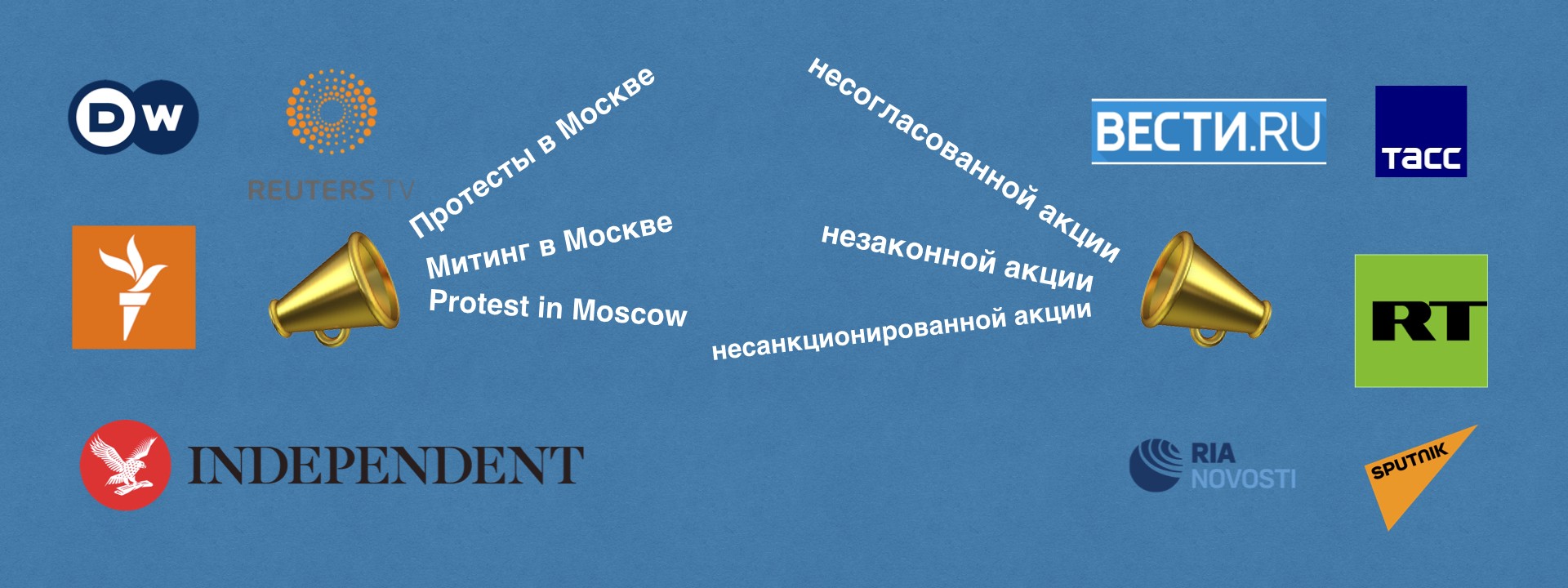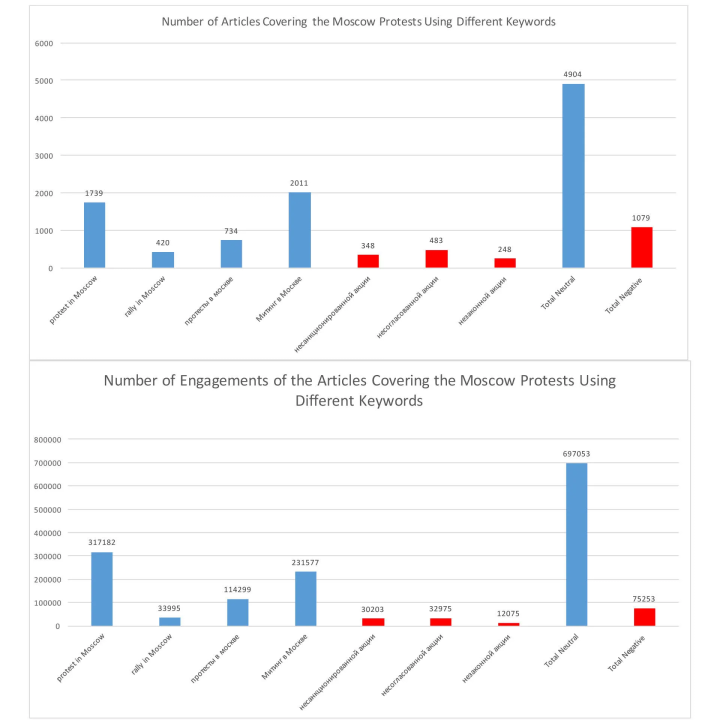Clashing Keywords in Coverage of the Moscow Protests
As the Moscow protests stretched into their sixth week, pro-Kremlin and independent media diverged sharply in the tone of their coverage
Clashing Keywords in Coverage of the Moscow Protests

BANNER: (Source: @LAndriukaitis/DFRLab)
During the week of August 26, 2019, as the protests in Moscow stretched into their sixth week, keyword analysis of media coverage showed that pro-Kremlin outlets and their pro-Western counterparts used different key phrases to refer to them
The DFRLab used the social media listening tool BuzzSumo to investigate which terms various media outlets used to describe the protests. Pro-Western outlets, such as the Independent and Radio Free Europe/Radio Liberty, preferred neutral descriptors such as “protests” or “rallies.” Meanwhile, pro-Kremlin outlets opted for negative value-loaded expressions, such as “unsanctioned action” or “unlawful action.”
Methodology
The DFRLab used BuzzSumo to identify the most engaged-with articles on the Moscow protests. The following key phrases were used in the search: “протесты в москве” (“protests in Moscow”), “Митинг в Москве” (“rally in Moscow”), “несогласованной акции” (“uncoordinated action”), “незаконной акции” (“unlawful action”), “несанкционированной акции” (“unsanctioned action”), and, in English, “protest in Moscow” and “rally in Moscow.”
In Russian, the same phrase can have several conjugations; thus, only the most engaged-with conjugation of each phrase was used. An examination of the most popular pieces of content confirmed that the BuzzSumo search was identifying protest-related material. Similarly, the DFRLab confirmed that, for all of the keywords, at least four out of the top five articles discussed the Moscow protests in the month of August.
Negatively Biased Coverage Appears Less Effective
The most popular key phrase in English, according to BuzzSumo, was “protests in Moscow.” In total, the DFRLab identified 1,739 articles with 317,182 total engagements. Most of the articles were published at end of July or in August. The most engaged-with media outlet was the English-language Moscow Times, which is considered an independent media outlet. APNews, Apple News, RFE/RL, and CBS News were among the most engaged-with outlets as well. The only propaganda media outlet using these keywords was RT, but it failed to amass significant engagement.

The same phrase in Russian generated significantly fewer articles, only 734 articles with 114,299 total engagements and concentrated in July and August. The most popular media platform was YouTube, which, in Russia, has far more objective sources and is less influenced by the Kremlin. Deutche Welle, a German publication the the Russian Ministry of Foreign Affairs accused of inciting the protests, was also among the most popular platforms, as were two Ukrainian sources, Dialog.ua and Obozrevatel.com.

Another English keyphrase that received significant engagement was “rally in Moscow.” This phrase garnered 420 articles with 33,995 engagements and was also concentrated in July and August, with a smaller number of articles in June.

The same phrase in Russian, “Митинг в Москве,” garnered significantly more engagement than the same phrase in English: 2,011 articles with 231,577 total engagements. YouTube dominated close to half of these engagements, with the neutral Vedomosti.ru and the opposition media outlets TV Rain, Svoboda.org, and Meduza.io following behind. No other engaged-with keywords in English with regard to the protests were identified.

The other Russian keywords that received significant engagement described the events in a negative light. The phrase that received the most engagement was “несанкционированной акции,” which is a conjugated version of the phrase “Несанкционированная акция” (“unsanctioned action”). It returned 349 articles with 30,203 engagements, most of which happened in July and August 2019, with a few articles in June and September 2018. Most of these articles were hosted on Russian-government controlled and propaganda outlets, such as Tass.ru, news.rambler.ru and ria.ru.

The most engaged-with negative phrase describing the Moscow events was “несогласованной акции,” which is a conjugated version of the phrase “несогласованная акция” (“uncoordinated action”), referring to an action that was not coordinated with or approved by the authorities beforehand. This phrase returned 483 articles with 32,974 engagements, concentrated, as in the previous searches, in July and August. The most popular media outlet using this phrase was the Russian version of RT. Among the other most popular websites were an array of Russian government-controlled and propaganda outlets, such as znak.com, vedomosti.ru, m24.ru, vesti.ru, and ria.ru.

Another negative phrase appearing in coverage of the Moscow protests was “незаконной акции,” a conjugation of “незаконная акция” (“unlawful action”). This phrase had 248 articles with 12,075 engagements, primarily concentrated in July and August. The most popular media outlet using this phrase was the government-controlled media outlet vesti.ru. Other popular websites included ria.ru, Rossiyskaya Gazeta (rg.ru), news.rambler.ru and Взгляд (vz.ru).

Further analysis showed that articles with negative keywords garnered far less engagement, suggesting that, despite the best efforts of pro-Kremlin media outlets, the traction of the articles with readers was limited. As the graphs show, both the number of articles and engagement with them using the neutral keywords was a few times higher than the ones generated by the pro-Kremlin outlets.

In the month of August, pro-Kremlin media outlets and independent or pro-Western outlets diverged sharply in the tone with which they covered the Moscow protests. Articles with an objective tone were more common and received greater engagement; nevertheless, there was still a wide array of negative coverage that made its way into the media environment, largely through Kremlin-controlled and pro-Kremlin outlets.
Follow along for more in-depth analysis from our #DigitalSherlocks.

